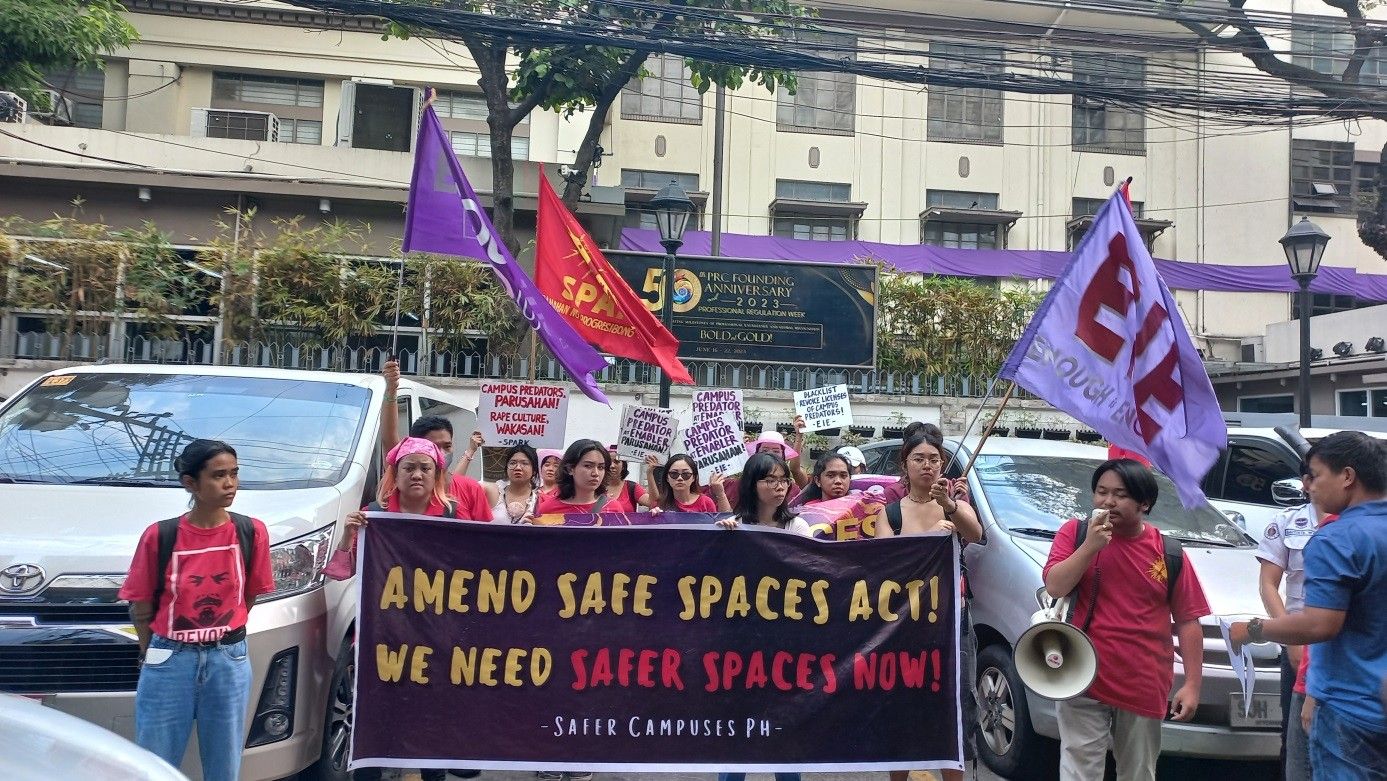On Int’l Women’s Day, students call to remove sexual abusers' license to teach

MANILA, Philippines — A newly launched coalition of advocates for students’ safety bannered a strongly worded campaign on International Women’s Day that they believe will resonate with dozens of victims of campus-based sexual harassment across the country: to remove “predatory” educators’ license to teach once and for all.
On Friday, the freshly convened Safer Campuses Ph trooped to the office of the Professional Regulation Commission (PRC) in Manila to submit a position paper that seeks to amend Republic Act 11313, or the Safe Spaces Act (SSA) to include the blacklisting of teachers found guilty of sexually harassing students.
Safer Campuses Ph was established on February 10 following the gathering of over 120 student leaders dedicated to students’ safety against sexual predators and enablers.
“Amidst the persistence of campus-based sexual harassment despite the SSA’s ratification five years ago, we believe in the need for stronger and more effective measures,” Kate Pauline Leonor of Safe Campuses Ph wrote in her letter to the PRC dated March 8.
Among the group’s proposed amendments to the SSA is to require schools to revoke the licenses of “campus predators” — those who show a pattern of sexually predatory behavior — and to have them permanently blacklisted.
“Predators must be prevented from having the authority to teach or work with students after their first offense. Too many times an abuser will resign or be fired only to have the option to continue the same work in a different school or campus and prey on other students,” the letter stated.
In their letter, the group also named three educational institutions where they said that the school administration either acted too slow to remove teachers accused of sexually harassing their students or had not prevented the accused educators from entering campus. Several accused also did not face administrative or criminal complaints, the group said.
“In all of these cases, the victims were unable to use the Safe Spaces Act to seek accountability from school administrations and have the predators sentenced to criminal sanctions,” the group said.
On the rare occasion that victims could file a case within their schools, they were allegedly “discouraged from pushing through because of the extensive and expensive legal process,” the group added.
The group pointed out that these were the circumstances that forced several victims to air their grievances on social media in the past years.
“These are the conditions that prove the necessity of stronger, more effective, and victim-centered measures that address the perennial issue of campus predators and the impunity they enjoy,” Safer Campuses Ph said.
The group also wants the SSA to be amended to require schools to step up their background checks and assessments of teachers when hiring to “avoid the negligence of Education and Training Institutions in their hiring processes, resulting in the employment of a sexual predator.”
Need for national sex offender registry
Besides amendments to the SSA — a law that covers all forms of gender-based sexual harassment committed in public spaces — Safer Campuses Ph is also campaigning for the creation of a publicly available national sex offender registry to deter teachers with a history of abusing students from seeking employment in other schools.
Lawmakers have sought the creation of a national sex offender registry at least as early as 2015 with the aim of maintaining a national database of sex offenders that would allow the government to more closely monitor their activities, including their risk for re-offending.
During a Senate hearing on the sexual abuse cases in the Philippine High School for the Arts in 2022, the National Bureau of Investigation recommended the Department of Education create a database that will have teachers' misconduct cases on file to allow schools to review their teacher applicants’ backgrounds.
“The establishment of a publicly available national registry of sex offenders will help ensure that predators are kept out of educational institutions and other employment that would risk exposure to vulnerable sections of the population,” Safer Campuses Ph’s position paper read.
In 2023, DepEd said that its hotline for student safety concerns had received 70 complaints related to sexual harassment since its creation in 2022.
This figure did not sit well with youth group Enough is Enough, a group that tracks sexual harassment incidents in schools as reported to them, who said that “far too many” cases have gone unreported.
“If anything, the figures released by DepEd are more alarming than reassuring, since we don’t know how many of the perpetrators from these 70 cases of sexual abuse still walk free inside campuses,” the group said.
- Latest
- Trending

























